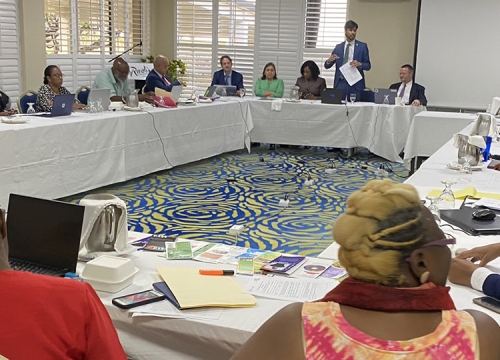Strengthening Human Rights Through Regional Engagement: Lessons Learned from the Treaty Body Follow-Up Review Pilot Series
Event


Geneva Academy
This side-event to the 56th Human Rights Council session, organized by the Geneva Human Rights Platform, aims to present the findings of the Treaty Body Follow-Up Review Pilot Series, an initiative jointly run with the Commonwealth Secretariat and the Pacific Community - SPC. The event will inform improvements in the follow-up review procedure as part of the new eight-year cycle for full reviews. The initiative, conceived as corollary to the broader treaty body strengthening process, involved pilot follow-up reviews in Sierra Leone (2021), Grenada (2022), and the Pacific Region (2023). Specifically, the objectives included assessing the effectiveness holding follow-up review sessions at the national and regional levels, fostering closer engagement with national and local stakeholders to ensure the practical implementation of human rights obligations, and identifying best practices and challenges in the follow-up process.
These pilots tested two models: national-level and regional-level follow-up reviews. National-level follow-up reviews provided in-depth engagement with local stakeholders, fostering cooperation among national actors and improved understanding of TB expectations. They also allowed TB members to grasp real situations, leading to more relevant and context-specific recommendations. Regional follow-up reviews enhanced broader cooperation and the sharing of best practices among multiple countries. A key aspect of these reviews was the emphasis on maximizing the use of UN regional hubs, which facilitate improved cooperation and accessibility for several countries in the region. This approach not only strengthened accountability but also ensured more context-specific and effectively disseminated TB recommendations.
Discussions will cover the pros and cons of both approaches, guiding the development of a more effective and context-sensitive follow-up review procedure, enhancing the overall efficiency and impact of the UN human rights treaty bodies.
Moderator
- Felix Kirchmeier, Executive Director, Geneva Human Rights Platform
Panel
- Marcia Kran, Member of the Human Rights Committee
- Domenico Zipoli, Project Coordinator, Geneva Human Rights Platform
- Yashasvi Nain, Human Rights Adviser, Commonwealth Secretariat
- H.E. Samuel Housman Buggie Saffa, Ambassador, Deputy Permanent Representative of the Republic of Sierra Leone to the UN in Geneva
- Representative from other Permanent Mission of participating country to the pilot series (Sierra Leone, Grenada, Fiji, Vanuatu, Tonga)









